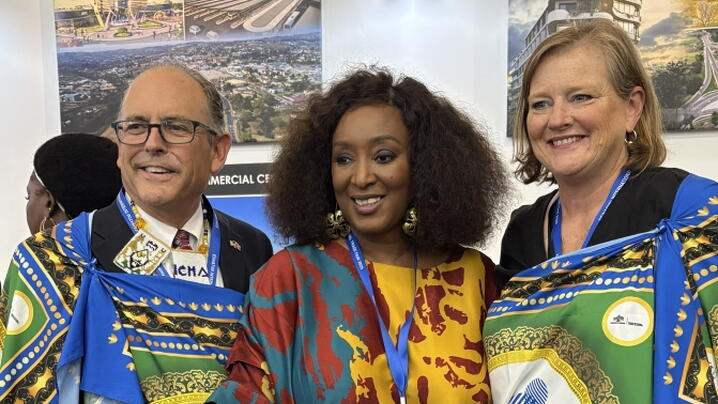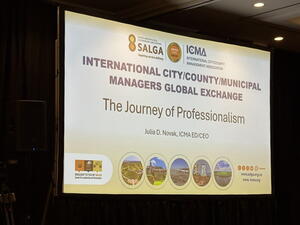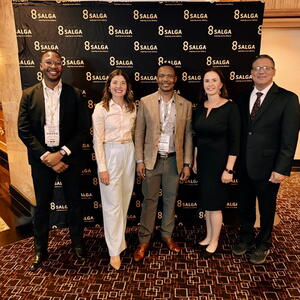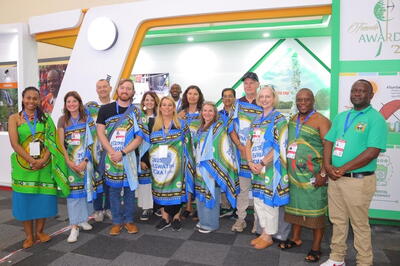
As the world marks Global Ethics Day on October 15, local government leaders, practitioners, and advocates are called to reflect on the values that shape our communities. The 2025 ICMA Global Exchange, held in Eswatini and South Africa, offered a powerful platform for this type of reflection—bringing together voices from across continents to share best practices in ethical leadership, professionalism, and the fight against corruption in rapidly changing world.
“Cities are at the front line of change and have the responsibility to lead with vision and courage.” - Lungile Dlamini, ICMA Vice President, International Region
Visionary Leadership: The Foundation of Thriving Communities
Speakers and attendees at the Global Exchange emphasized that ethical leadership is not just about a single individual making “good,” “right,” or “moral” decisions— it’s about inspiring trust in others, supporting innovation, and building resilient communities.
ICMA President-elect Michael Land celebrated Eswatini’s commitment to sustainable development, highlighting the importance of love and knowledge as guiding principles. He noted, “Knowledge will forge the country’s future working with the resources that are available, and love will drive its commitment to the community.” Values in a community are the bedrock of visionary leadership, driving decisions and actions. As public servants, we’re reminded that local government work is ultimately about people. It’s about creating thriving communities through those shared values.
On-The-Ground: Building Trust and Capacity

Professionalism in local government is more than a set of standards; it’s a culture of accountability, transparency, and continuous improvement. Throughout the global exchange, panelists stressed the critical need for professionalization as a bulwark against corruption and inefficiency.
Julia Novak, ICMA CEO/executive director, traced the roots of professional local government in the United States of America to early 20th-century reformers who sought to combat corruption through ethical city management. Today, ICMA’s credentialing program and Code of Ethics set the bar for ongoing professional development and ethical conduct. Novak reminded attendees that “professional local government is built on leadership, management, innovation, and ethics, and requires ongoing commitment to professional standards.”
South Africa’s journey mirrors this commitment. In 1998, a delegation of ICMA members and staff traveled to South Africa, met with President Nelson Mandela and provided input into the development of the 1998 White Paper on Local Government, South Africa's foundational policy for democratic local governance, establishing municipalities as engines for service delivery, social and economic growth, and community empowerment. The 2025 revision of the 1998 White Paper on Local Government, discussed by Dr. Namane Dickson Masemola, deputy minister, Cooperative Governance and Traditional Affairs, is a “policy refresh” aimed to strengthen financial management, enhance service delivery, and reinforce oversight and accountability to meet the changing times and rejuvenate local governance in South Africa. The Public Service Commission Bill, currently under consideration in the South African National Assembly, seeks to restore integrity and rebuild public trust through professionalization—especially in municipalities where confidence has eroded.
Anti-Corruption: Ethics as the “Saucer” to Professionalism

During the Municipal Managers Forum in South Africa, ethics and anti-corruption were central themes in the remarks by Seth Mazibuko, chief operations officer, Moral Regeneration Movement (MRN). He explained ethics is the “saucer” holding the “cup” of professionalization—upholding ethics is essential for value-driven communities and effective service delivery. Mazibuko’s call to “gather stones to build the South Africa we want” resonated as a metaphor for collective action against corruption and for ethical governance.
Panel discussions at the Eswatini Sustainable Urban Development Seminar explored practical strategies for embedding ethics and combating corruption:
- Adaptability: Cindy Steinhauser, ICMA Regional vice president, Midwest region (deputy city administrator, Rochester, Minnesota), emphasized the role of government as a “constant North Star” during crises. Her “four P’s”—People, Planning, Partnership, and Performing—guide her team’s work, ensuring that adaptability and ethical decision-making are at the core of service delivery.
- Integration: Sipho Cele, deputy municipal manager, Ethekwini, South Africa, described how adversity forced his city to rethink traditional management, focusing on coordination and responsiveness to community needs. This integrated approach, where all departments work with a single agenda, is key to preventing corruption and inefficiency.
- Financial Resilience: Panelists advocated for dedicated financial reserves, development levies, and surcharges to fund resilience initiatives transparently. Consolidated planning and data-driven decision-making were highlighted as tools to prevent waste and ensure ethical stewardship of public resources.
Digital Transformation: Ethics in the Age of AI
As cities embrace digital transformation, ethical leadership becomes even more critical. Gciniwe Fakudze, CEO, Municipal Council of Mbabane, shared Eswatini’s journey toward smart city status, emphasizing that technology must serve people first and foremost. Partnerships, change management, and community education are essential to align digital innovation with ethical values.
ICMA Global Engagement Committee vice-chair, Yulia Carter (assistant city manager, Pacifica, California), introduced an AI virtual assistant providing multilingual access to city services. She stressed that “policy is more important than technology,” and that sustainability lies in frameworks and governance, not in any single tool. Strong guardrails and transparency are vital to building public trust and preventing misuse.
Panelists also warned against “solutions in search of problems” and the risk of digital divides. Inclusivity and digital literacy must be embedded prior to implementation, ensuring that marginalized groups are not left behind. Ethical digital transformation requires people-centered approaches, sustainable partnerships, and governance transparency.

Organizational Culture
Talent retention and development were highlighted as ongoing challenges by attendees, especially in rural and smaller municipalities at the 7th Annual South African Local Government Association Talent Management Seminar. Diversity management practices aim to bridge social and institutional barriers, driving business outcomes through strategic human capital initiatives. Social cohesion, supported by value-driven leadership, is essential for building inclusive organizations. Transforming institutional culture and ensuring culture fit are key to attracting and retaining talent, and progress requires creating space for uncomfortable but necessary conversations.
Creative partnerships, internships, and knowledge exchanges, such as the ICMA Global Exchange, help to keep staff motivated and learning. Karen Pinkos, city manager, El Cerrito, California, spoke passionately about the importance of representation in leadership: “You can’t be what you can’t see.” Her city’s strategic planning, policies, and recognition events are infused with equity and inclusion principles, fostering belonging for staff and community members alike. She noted leadership and professionalism are inseparable from culture. Organizational agility, modeled through leadership values and open communication, is essential for adapting to change, while maintaining ethical standards.
Presenters from the commissions on employee wellness and diversity management underscored the human side of ethical leadership. Promoting wellness is essential for individual effectiveness and building resilient municipalities. Psychological safety and open dialogue foster healthy work environments. They also noted that even though AI can enhance interaction with community or staff, it cannot replace empathy, emotion, or consciousness.
Measuring Impact: Leadership Development
ICMA's Global Engagement Committee chair, Betsy Keller (county administrator, El Paso County, Texas), led a discussion on measuring the return on investment of leadership development. She noted that investment in leadership drives engagement, innovation, productivity, financial gains, and public trust. The Phillips ROI Methodology was presented as a tool for accountability, ensuring that investments in training lead to tangible results and improved service delivery.
Networking, reputation, and credibility are additional benefits of leadership development, often overlooked in traditional ROI calculations. Keller shared a personal story of a negotiation tip she learned at an ICMA conference that later earned her county $1 million dollars annually—a testament to the value of investing in leadership development and professional networks.

The Way Forward: Ethics as a Global Imperative
Sizwe Dlamini, head of strategy, Municipal Council of Manzini, Eswatini, shared a closing message, “Importance placed on knowledge exchange and the exchange of best practices was echoed [here], with emphasis on the shared goal of increasing and growing learning platforms for continued connection across the region in Africa and with ICMA.”
The lessons from Eswatini and South Africa remind us that ethics is not a luxury—it is a necessity for building trust, driving innovation, and creating communities where everyone can flourish. Let us lead with integrity, act with professionalism, and stand united against corruption— on Global Ethics Day and every day.
New, Reduced Membership Dues
A new, reduced dues rate is available for CAOs/ACAOs, along with additional discounts for those in smaller communities, has been implemented. Learn more and be sure to join or renew today!
